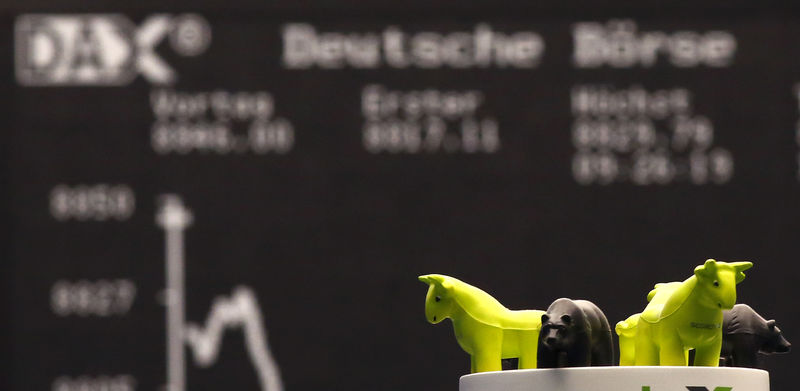Investing.com - European stock markets traded lower Wednesday, with risk sentiment hit by the surprise downgrade to the U.S.’s top-tier sovereign rating as well as slowing regional growth.
At 03:35 ET (07:35 GMT), the DAX index in Germany traded 1.3% lower, the CAC 40 in France dropped 0.9% and the FTSE 100 in the U.K. traded 0.9% lower.
Fitch downgrades U.S. credit rating
Fitch downgraded the United States to AA+ from AAA late Tuesday, citing likely fiscal deterioration over the next three years and repeated down-to-the-wire debt ceiling negotiations that threaten the government’s ability to pay its bills.
The rating agency had first mentioned the possibility of a downgrade in May, but this announcement came as something of a surprise given it maintained its rating in June after the U.S. debt ceiling crisis was resolved.
This decision brought a sharp response from the U.S. government, with Treasury Secretary Janet Yellen calling it "arbitrary and based on outdated data."
The long term impact of this decision is debatable, but over the short term U.S. bond yields fell as investors, somewhat ironically, sought the safety of U.S. sovereign debt, while equities retreated in Asia, and are likely to do the same in Europe.
Eurozone manufacturing activity weakens
Confidence in European markets had already been hit by the release Tuesday of disappointing manufacturing activity data, suggesting the eurozone economy was set for a bumpy ride in the second half of the year.
The economic data slate is largely empty in Europe Wednesday, but investors may also be keeping an eye on the political turmoil in the U.S., with former President Donald Trump charged late Tuesday with conspiracy to defraud the U.S. and other crimes related to his efforts to overturn his 2020 presidential election loss.
Siemens Healthineers reports drop in quarterly profit
Back in Europe, Siemens Healthineers (ETR:SHLG) stock slumped over 6% after the medical device maker reported a drop in quarterly operating profit and free cash flow due to the tailing-off of its rapid COVID-19 antigen test business.
Haleon (LON:HLN) stock fell 1.5% despite the consumer healthcare company raising its forecast for annual organic revenue growth, expressing confidence that demand for its oral and respiratory health products will stick despite a cost-of-living squeeze.
BAE Systems (LON:BAES) stock climbed 4.5% after the U.K. defence group raised its annual guidance after a strong first half, with military spending soaring.
Crude prices rise after record U.S. inventories draw
Oil prices rose Wednesday, near to their highest levels since April, after industry data pointed to a hefty fall in U.S. inventories, indicating robust demand from the world's biggest fuel consumer.
Data from the American Petroleum Institute, released on Tuesday, showed that U.S. crude inventories shrank by 15.4 million barrels in the week to July 28, the largest draw seen in data stretching back to 1982.
Official data, from the Energy Information Administration, are due later in this session, for confirmation.
By 03:35 ET, the U.S. crude traded 0.7% higher at $81.96 a barrel, while the Brent contract climbed 0.7% to $85.47.
Additionally, gold futures rose 0.4% to $1,986.05/oz, while EUR/USD traded 0.1% higher at 1.0994.
